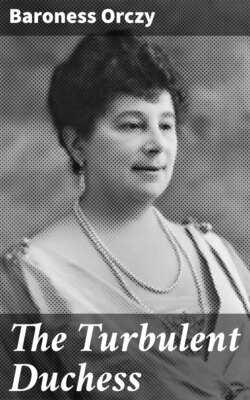Читать книгу The Turbulent Duchess - Baroness Orczy - Страница 3
На сайте Литреса книга снята с продажи.
Foreword
ОглавлениеTable of Contents
When our mothers were still in their teens, when women wore crinolines, and chignons and prunella boots, when Queen Victoria sat, a sorrowing widow, on the throne of England, and her son could look forward with assurance to succeeding her one day, when one drove four days in a calèche from York to London, and it took six months to get to Australia, when there was no talk of S.A. and waists were eighteen inches round, there still lingered in the grim old fortress of Brünnsee in Bohemia a decrepit, obese, old lady who had once been Regent of France and had half Europe at her feet. She was Madame Marie Caroline Ferdinande Louise, Princess of Naples, daughter of Kings, niece of one Queen, great-niece of another, great-granddaughter of an Empress; she was the widow of the Due de Berri, who would have been King of France but for the dagger of the assassin Louvel.
Crippled with rheumatism, so blind that she could no longer read, even with the aid of spectacles, she sat most of the day by the window in a high-backed chair, in a large ill-furnished room, a room full of memories, all of them sad, not one of them glorious; an empty bird-cage, a dog-basket, a spinet with broken cords, a mechanical toy which had once belonged to her son the Due de Bordeaux, its mechanism now broken, the toy as useless as Madame’s longings and dreams; a model of the ship Carlo Alberto, on which she had set sail one day, in order to reconquer the heart of France. All day she would sit and gaze out of the window with her dimmed eyes fixed on the dreary pine-clad mountains of Bohemia, as Napoleon did once, from the fastnesses of Saint Helena, on the turbulent Atlantic that framed in his place of exile. And as Napoleon used to murmur with sighs of longing: “France! France!” so did Madame murmur: “Sicily! my Sicily!” the land of palms and orange groves, of blue skies and sun-baked earth. Sicily, her home! If only she could have gone back to Sicily.
From the upstairs room over her head there would come at times the merry sound of the pattering of small feet; her grandchildren were up there. Their parents would bring them over from Italy sometimes to cheer granny’s solitude. The children of her children, of Clementine and Isabella and Francesca, and of Adinolphe her Benjamin. They would come now and again, the whole brood of them, raising the echo of the grim chateau with their laughter, their chatter and their infantile screams: smashing a few more things, leaving after their departure the place just a little more dilapidated, a little more ramshackle than it was before, and their granny a little more sad, a little more solitary, by contrast with their gaiety. They were her Italian family, the children and grandchildren of the only man who had ever loved her truly and faithfully. She hardly ever saw her French children, her son the Comte de Chambord, Duc de Bordeaux, was at Frohsdorf or at Goritz studying the difficult craft of kingship—a craft which he was never destined to exercise. Her daughter was in exile with her family.
And sitting alone in her high-backed chair, watching the twilight slowly creeping over mountain and lake, and the various landmarks fading into the gloom, Madame Caroline would close her weary eyes and, neither sleeping nor waking, see pictures of her past life rise out of the shadows. Memories, some of them glorious, some of them sad, most of them bitter, would crowd ghostlike around her; and she would see her sorrows, her few joys, her many disappointments and final humiliation pass like an ever-changing picture before her mental vision, caus¬ing a smile to break at times around her flaccid lips, but more often a tear to roll down her wrinkled cheek.
